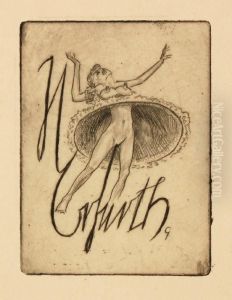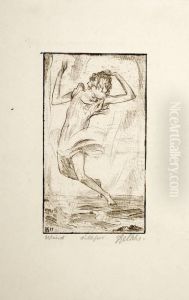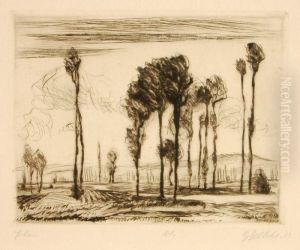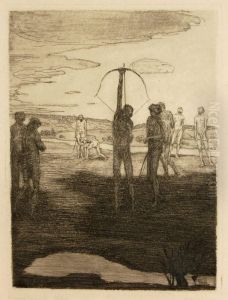Georg Gelbke Paintings
Georg Gelbke was a notable German painter and graphic artist, whose work offers a fascinating glimpse into the early 20th century art movements, particularly those in Germany. Born on July 5, 1882, in Rochlitz, Saxony, Gelbke showed an early interest in art which led him to pursue his studies at the Royal Academy of Fine Arts in Dresden, one of the most prestigious art schools in Germany at the time. Under the tutelage of prominent artists and educators, he honed his skills in painting and graphic arts, laying the groundwork for his future career.
Gelbke's artistic journey was significantly shaped by the tumultuous events of the early 20th century, including World War I and the interwar period. His work during these times often reflected the social and political upheaval of the era, capturing the zeitgeist of post-war Germany with a particular focus on landscapes, urban scenes, and the human condition. Gelbke was part of a generation of artists who sought to navigate the complexities of modernity, industrialization, and conflict through their work, often employing expressionist techniques to convey their observations and emotions.
After serving in World War I, Gelbke's experiences deeply influenced his artistic direction, leading to a body of work that was characterized by a more somber and reflective tone. Despite the challenges of the post-war period, including economic instability and the rise of National Socialism, Gelbke continued to work and exhibit his art. He participated in various exhibitions, both solo and group, that helped to establish his reputation within the German art scene.
The rise of the Nazi regime and the onset of World War II further complicated the lives of many artists in Germany, including Gelbke. Restrictions on artistic expression and the persecution of those deemed non-conformist or politically undesirable affected the art community deeply. Information on how these events directly impacted Gelbke's career and personal life is less documented, but like many of his contemporaries, he likely faced significant challenges during this period.
Georg Gelbke passed away on March 24, 1947, in Dresden, leaving behind a legacy that reflects a poignant and critical engagement with the world through the lens of German art in the first half of the 20th century. His contributions to the fields of painting and graphic art remain a testament to the resilience and creativity of artists in times of adversity. Gelbke's work continues to be studied and appreciated for its historical significance and artistic merit, offering insights into the complex interplay between art, society, and politics during one of the most turbulent periods in modern history.




